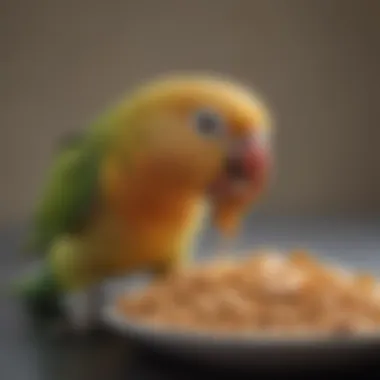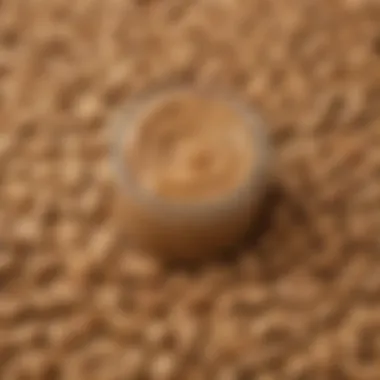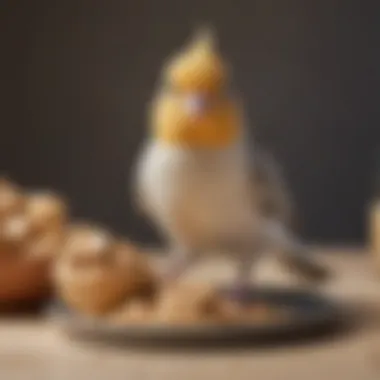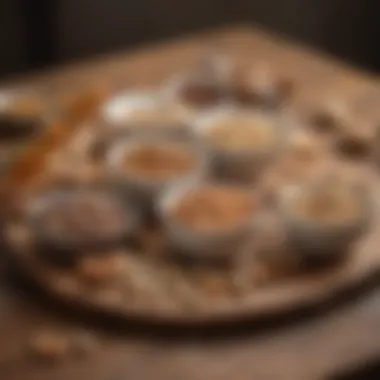Nutritional Considerations: Can Pet Birds Eat Peanut Butter?


Intro
The cuisine choices for pet birds often evoke curiosity and concern among avian enthusiasts. One commonly posed query is whether peanut butter can find its place in their diet. To unravel this, it’s important to explore the nutritional fundamentals of peanut butter and how they align with the dietary needs of various bird species. This section will provide insight into essential care tips, behavioral insights, nutritional guides, wellness, and enrichment activities—all vital aspects of ensuring a pet bird's wellbeing.
Care Tips
Daily Care Routines
Caring for pet birds requires a series of repetitive but important tasks. Regular feeding schedules and fresh water supply are crucial. Ensure that the food and water are checked at least once a day. Birds can show behavioral changes if their food or water is not accessible. Mixing a variety of seed and fresh fruits reinforces a balanced diet. This routine is fundamental to keeping your bird healthy and content.
Cage Setup and Maintenance
A clean and spacious cage promotes physical and mental well-being. The cage should allow for free movement. The lining should change frequently to offer a hygienic environment. Adequate perches and toys are essential for play and exploration. Also, position the cage away from drafts and extreme temperatures for safety.
Hygiene and Cleaning Practices
Food remnants attract unwanted pests, and as such, cleaning the cage is paramount. Use mild soaps or vinegar to scrub the cage and accessories. Every week, give the entire cage a thorough wash and rinse it properly. Keeping your bird's habitat clean aids in both health aspects and overall quality of life.
Seasonal Care Adjustments
Seasonal changes can impact a bird's behavior and health. During colder months, make necessary adjustments like ensuring additional warmth. In the summer, cooling should be available without exposing them to direct sunlight for extended periods. Observing subtle changes through the seasons allows for timely care.
Prologue to Peanut Butter and Avian Diets
Understanding how pet birds interact with various foods, including peanut butter, is important for their health and nutrition. Bird owners often seek to supplement traditional diets with safe and enjoyable treats. Peanut butter, a common human snack, poses unique questions regarding its suitability for avians. In this article, we will explore the nutritional aspects of peanut butter, its potential benefits and risks, and how to serve it sensibly to pets. This knowledge helps pet owners make clear, informed decisions regarding their birds’ diets.
Understanding Avian Nutritional Needs
Pet birds require a balanced diet to thrive. Unlike mammals, birds have specific nutritional needs that differ among species. Typically, their diet should include a variety of grains, seeds, fresh fruits, and vegetables. Essential nutrients for birds include proteins, fats, carbohydrates, vitamins, and minerals. Notably, many birds enjoy seeds and nuts but they should not dominate their diet due to fat content. Owners should be aware of their bird's species-specific needs, age, and health status. Ignoring these factors can lead to nutritional deficiencies and health concerns.


Peanut Butter: An Overview
Peanut butter is a widely enjoyed food for many. But for birds, it garners mixed opinions. Made by grinding roasted peanuts, it is rich in protein and healthy fats. Along with its appetizing flavor, peanut butter can be an attractive occasional treat for pet birds. However, the processing behind commercial versions often introduces salt, sugar, and preservatives that may not be safe for avian consumers. Understanding the composition and proper preparation of peanut butter is integral before offering it to pet birds.
Nutritional Profile of Peanut Butter
Understanding the nutritional profile of peanut butter is critical for assessing its suitability for pet birds. This section delves into the essential nutrients found in peanut butter alongside potential hazards linked with its consumption. While many pet owners seek nutrient-dense treats for their avian companions, it is vital to analyze both the benefits and risks associated with peanut butter.
Key Nutrients in Peanut Butter
Peanut butter is rich in several macro and micronutrients. Some key nutrients include:
- Proteins: Essential for feather growth and muscle repair, proteins play a significant role in your bird’s overall health. Peanut butter, despite being plant-based, offers a protein content that can help support an active lifestyle.
- Fats: These include both saturated and unsaturated fats. While they provide essential energy, a careful balance is crucial to avoid obesity. Birds require fats, but excessive intake from more calorie-dense foods, like peanut butter, can lead to weight problems.
- Vitamins: Particularly vitamin E, a powerful antioxidant that supports immune health. Vitamin B6 is also present, which helps in the metabolism of proteins.
- Minerals: Minerals such as magnesium, phosphorus, and potassium contribute to various bodily functions, promoting good health.
Important is maintaining proper portion sizes to ensure any potential benefits of peanut butter do not overshadow its risks.
Potential Hazards and Contaminants
While peanut butter has noteworthy nutritional aspects, it poses several risks that pet bird owners should consider deeply:
- Aflatoxin Risk: Peanuts can sometimes be susceptible to aflatoxin contamination, a potent toxin produced by mold. Birds are particularly sensitive to this toxin and consumption may lead to severe health issues.
- High Fat Content: Though certain fats are required, peanut butter can carry excessive amounts. This can lead to obesity among less active bird species, catalyzing a variety of health problems. Careful monitoring of intake and balance with other food are crucial.
- Added Ingredients: Many commercially available peanut butters contain sugars, salt, or preservatives that are not mandatory for birds. Always check labels to ensure you are offering a safe product for your pet.
“A balanced diet is paramount to a bird's well-being; hence, moderation when including peanut butter in your bird's diet is essential.”
Ultimately, understanding the nutritional profile of peanut butter can guide bird owners in making informed choices that benefit their pets. An awareness of both the potential nutrients and risks is pivotal for maintaining an optimal and safe diet. Maintaining an informed approach protects the health of pet birds while allowing some enjoyable treats.
Health Implications of Peanut Butter for Birds
Peanut butter can be a common food in many households. But what about pet birds? Understanding the health implications of peanut butter consumption among birds is crucial for their overall well-being. This section focuses on the specific advantages peanut butter might offer as a treat, as well as the potential hazards associated with its consumption.


Benefits of Peanut Butter for Pet Birds
Peanut butter has certain nutritional elements that could be beneficial for pet birds. For instance:
- High in Proteins: Peanut butter contains a decent amount of protein, which is essential for muscle development and repair in birds.
- Source of Healthy Fats: It includes monounsaturated fats that can help provide energy and contribute to a shiny plumage.
- Vitamins and Minerals: This spread contains nutrients like vitamin E and magnesium, important for metabolic processes.
Additionally, peanut butter can stimulate a bird's natural foraging instincts. Birds can enjoy the act of pecking at and exploring the texture of peanut butter, which activates their physical and mental skills. This variation can enhance their feeding experience, preventing boredom.
Risks and Concerns Associated with Peanut Butter
Despite its benefits, there are critical risks to consider. Direct consumption of peanut butter may expose birds to several hazards:
- Fat Content: The high-fat proportion can lead to obesity if served in excess, particularly in smaller species that are more prone to weight gain.
- Sugar and Salt: Many peanut butter products contain added sugars or salt. These can be harmful to birds, causing health problems like spiking blood sugar or dehydration.
- Mycotoxins: Raw or improperly stored peanuts may contain aflatoxins, harmful substances produced by mold. Birds exposed to these toxins can suffer severe internal damage.
Understanding these concerns is vital for making informed choices about your pet's diet. Always ensure allergens and harmful additives like xylitol or chocolate, found in some products, are avoided at all costs.
It is essential to evaluate both advantages and disadvantages carefully before introducing peanut butter into your pet bird's diet.
Serving Considerations for Peanut Butter
Understanding how to serve peanut butter to pet birds is quite crucial. This is not simply about providing a tasty treat; rather, it involves considering the nutritional needs of different species of birds and their individual health conditions. Careful serving ensures that the benefits associated with peanut butter do not lead to unforeseen health issues. Therefore, before introducing peanut butter into a bird's diet, knowledge of proportions and preparation methods is vital.
Ideal Serving Sizes for Different Bird Species
Determining appropriate serving sizes of peanut butter can vary considerably between bird species. Smaller birds, for example, require much less peanut butter than larger parrots or cockatoos. Here are some general guidelines to keep in mind:
- Canaries and Budgies: A small dollop, about the size of a pea. This keeps calorie intake low, which is essential for their small size.
- Parakeets and Cockatiels: A bit more generous, a size closer to a marble. These birds have slightly higher caloric needs, yet should not overindulge.
- Amazon and Macaws: Larger birds can handle more, about half a teaspoon, yet it is critical to watch their overall fat intake.
It's crucial to treat peanut butter as a supplement rather than a primary food source. Over time, if these treat sizes lead to weight gain or any visible health issues, immediate reduction or cessation is recommended. Please also remember to monitor overall revered food analytics for your birds. This helps provide a comfortable balance in their diets.


Safe Preparation Methods
How peanut butter is prepared can play a significant role in the health of your pet bird. Here are some suggestions for safe preparation:
- Choose Natural Varieties: Select unsweetened and unflavored peanut butter. It's best if it contains purely peanuts, with no additives or sugars.
- Serve Alone or with Healthy Foods: Peanut butter can be spread on small pieces of fruits or toys to enhance interaction and be nutritious at the same time.
- Limit Frequency: Consider serving peanut butter only as an occasional treat rather than a daily addition, avoiding excessive calorie intake.
- Observe Reactions: After first introducing peanut butter, pay carefull attention to any odd behavior in your birds. Any signs of discomfort or illness require prompt consultation with an avian vet.
By adhering these simple methods for serving peanut butter, you can integrate this more effectively into your pet’s dietary routine, creating a healthy and engaging treat experience.
Alternative Treats for Pet Birds
Understanding the significance of alternative treats is paramount for ensuring the health and happiness of pet birds. While peanut butter may offer some benefits, it is essential to consider a broader range of dietary options. Providing a variety of treats can help meet a bird's nutritional needs while also preventing potential health issues associated with specific foods.
Alternative treats not only serve as enjoyable snacks but also contribute significantly to an overall balanced diet. Choosing the right substitutes can improve physical health, promote mental stimulation, and even foster a stronger bond between the bird and its owner.
Healthier Options for Bird Treats
A range of healthier options exists that are generally safe and beneficial for pet birds. These can include:
- Fresh Vegetables: Leafy greens like kale, spinach, cilantro, and carrots can add essential vitamins and minerals.
- Fruits: Apples, berries, and banana slices are very nutritious and loved by many bird species.
- Seeds and Nuts: Although high in fat, nuts like almonds or walnuts can be offered occasionally in small amounts. Be sure to avoid salted or sweetened varieties.
- Cooked Grains: Foods like quinoa or brown rice can enhance a bird's diet without overwhelming them with fat.
Epilogue: Balancing Treats and Nutrition
Understanding how to balance treats like peanut butter with a bird's overall diet is vital for their health. Many pet bird owners may question whether offering such treats benefits their feathered companions or poses risks. The significance of informed decision-making cannot be overstressed in this context. It involves a careful evaluation of the nutritional profile of treats, such as peanut butter, alongside their main diet.
Birds, like any other pets, require a balance of essential nutrients to thrive. This includes vitamins, minerals, and other dietary components. Peanut butter has certain benefits, yet it should not replace a bird's staple diet, which typically consists of seeds, pellets, fruits, and vegetables. Treatment should complement their nutrition rather than hinder it.
Another crucial aspect is the risk of overindulgence. Birds can become overweight if treats are offered too frequently or in excessive amounts. Many nut butters provide significant calorie counts, particularly if flavored or processed with additional ingredients. The response of each bird’s digestive system can vary, affecting their health with prolonged intake of unhealthy or unsuitable foods.
To summarize, finding a balance between enjoyable treats and nutritional needs is key. Bird owners should take the responsibility to educate themselves on safe serving sizes and methods. This careful approach reflects a deep consideration for their birds’ well-being, ensuring a healthy and enriching life for their avian companions.
Making Informed Choices for Bird Welfare
Bird owners need to make conscious choices that prioritize the well-being of their pet birds. The realm of animal nutrition is intricate. Each species has distinct dietary requirements. By recognizing these needs, owners contribute significantly to the health of their birds.
First, it's important to assess the specific needs of your bird species. What works for one species may not be suitable for another. Maintaining a varied and balanced diet includes both solid foods and occasional treats. Here are considerations for informed choices:
- Diet Variety: Integrate different types of vegetables, fruits, and recommended seeds with any treats. This mix supports essential nutrient intake.
- Consultation with Experts: Reach out to a veterinarian experienced with birds. They can provide tailored advice regarding dietary choices.
- Brand Research: If using pre-made bird treats or peanut butter, understand the ingredients. Many commercial products contain additives that may not be healthy.
- Gradual Introduction: If planning on introducing peanut butter as a treat, start with a small amount. Monitor your bird for any adverse reactions.















